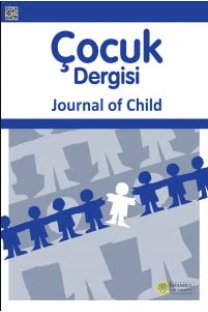Primer Raynaud Sendromunda Akut Vasküler Komplikasyonlar ve Tedavi
Primer Raynaud sendromu, vasküler komplikasyon, kalsiyum kanal blokerleri
Acute Vascular Complications and Treatment in Primary Raynaud’s Syndrome
___
- 1. Raynaud M. On local asphyxia and symmetrical gangrene of the extremities. Arc Gen Med 1874; 1:189.
- 2. Cassidy JT, Zulian F. The systemic sclerodermas and related disorders. In: Cassidy JT, Petty RE, Laxer RM, Lindsley CB (eds), Textbook of Pediatric Rheumatology. Philadelphia: Elsevier Saunders, 2005: 442-81.
- 3. Voulgari PV, Alamanos Y, Papazisi D, Christou K, Papanikolaou C, Drosos A. Prevalence of Raynaud’s phenomenon in a healthy Greek population. Ann Rheum Dis 2000; 59:206-10.
- 4. Nigrovic PA, Fuhlbrigge RC, Sundel RP. Raynaud’s phenomenon in children: a retrospective review of 123 patients. Pediatrics 2003; 111:715-21.
- 5. Burns EC, Dunger DB, Dillon MJ. Raynaud’s disease. Arch Dis Child 1985; 60:537-41.
- 6. Quartier P. Raynaud’s phenomenon in children. Arch Pediatr 2004; 11:74-7.
- 7. Wigley FW, Korn JH, Csuka ME, et al. Oral iloprost in patients with Raynaud’s phenomenon secondary to systemic sclerosis. Arthritis Rheum 1998; 41:670-7.
- 8. Vogelzang NJ, Bosl GJ, Johnson K, Kennedy BJ. Raynaud’s phenomenon: a common toxicity after combination chemotherapy for testicular cancer. Ann Intern Med 1981; 95:288-92.
- 9. Brand FN, Larson MG, Kannel WB, McGuirck JM. The occurrence of Raynaud’s phenomenon in a general population: the Framingham study. Vasc Med 1997; 2:296-301.
- 10. Vayssairat M, Abuaf N, Baudot N, Deschamps A, Gaitz JP. Abnormal IgG cardiolipin antibody titers in patients with Raynaud’s phenomenon and/or related disorders: prevalence and clinical significance. J Am Acad Dermatol 1998; 38:555-8.
- 11. Rodeheffer RJ, Rommer JA, Wigley F, Smith CR. Controlled double-blind trial of nifedipine in the treatment of Raynaud’s phenomenon. N Engl J Med 1983; 308:880-3.
- 12. Belch JJ, Ho M. Pharmacotherapy of Raynaud’s phenomenon. Drugs 1996; 52:682-95.
- 13. Dziadzio M, Denton CP, Smith R, et al. Losartan therapy for Raynaud’s phenomenon and scleroderma: clinical and biochemical findings in a fifteen-week, randomized, parallel-group, controlled trial. Arthritis Rheum 1999; 42:2646-55.
- 14. Hettema ME, Zhang D, Bootsma H, Kallenberg CG. Bosentan therapy for patients with severe Raynaud’s phenomenon in systemic sclerosis. Ann Rheum Dis 2007; 66:1398-9.
- ISSN: 1302-9940
- Yayın Aralığı: 4
- Başlangıç: 2000
- Yayıncı: İstanbul Üniversitesi
Altı-On İki Yaş Grubu Çocukların Diş Sağlığını Etkileyen Anneye Ait Faktörlerin Araştırılması
Necmi NAMAL, Hayriye ERTEMVEHİD, Suphi VEHİD, Günay CAN
Primer Raynaud Sendromunda Akut Vasküler Komplikasyonlar ve Tedavi
Yakup ERGÜL, Kemal NİŞLİ, Aygün DİNDAR, Ümrah AYDOĞAN, Rukiye Eker ÖMEROĞLU, Türkan ERTUĞRUL
Dilek DİLLİ, Şerife S OĞUZ, Hülya ÖZKAN ULU, Uğur DİLMEN
Transfüzyon Gerektiren Hemoperikardiyum ve Kalp Tamponadı
Yakup ERGÜL, Kemal NİŞLİ, Aygün DİNDAR, Ümrah AYDOĞAN, Rukiye Eker ÖMEROĞLU, Türkan ERTUĞRUL
Lamotrijin İlişkili Dress Sendromu: Bir Vaka Sunumu
Ebru ARIK YILMAZ, Serap ÖZMEN, Nilden TUYGUN, Tayfun GİNİŞ, Gönül TANIR
Yatarak İzlenen Rotavirüs Vakalarımızın Epidemiyolojik Özellikleri ve Nozokomiyal İnfeksiyon
Olcay YASA, Müferret ERGÜVEN, Sinem KARACA ATAKAN, Nilüfer ÇETİNER, Tevfik MISIRLI, Ali AKKOÇ
Muazzez GARİPAĞAOĞLU, Nuray KUYRUKÇU
Smith-Lemli-Opitz Sendromu SLOS : Prenatal ve Postnatal Dönemde Tanısı
Ayça DİLRUBA ASLANGER, R Özgür ROSTİ, Hülya KAYSERİLİ
Hipokrom Mikrositer Anemide Demir Eksikliği Anemisi ve Talasemi Taşıyıcılığı Oranları
Fatma OĞUZ, Tuğçe Aksu UZUNHAN, Fatih Köksal BİNNETOĞLU, Hayriye ERTEM VEHİD
